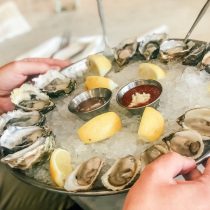
Easter is the date on which Chileans significantly increase the consumption of fish and seafood. Although these foods have a large number of benefits for the body, if they are not handled, prepared and preserved correctly, discomfort and dangerous poisoning can occur.
In this scenario, what are the precautions we should take when buying, preparing and consuming fish and seafood?
According to Eliana Reyes, a nutritionist and director of the School of Nutrition at the Universidad de los Andes, the consumption of raw products should be avoided and kept refrigerated.
“Easter has always been characterized by the high consumption of fish and seafood. However, on this date it is also possible to observe an increase in the number of people intoxicated by the consumption of these foods. To avoid these poisonings it is advisable to consume these cooked products and that in their transport and conservation the cold chain has been maintained, this because bacteria that produce toxins proliferate in the meat of the fish if they have not been preserved in cold or toxins present in the algae proliferate in the bivalve shellfish “, explains Dr. Reyes.
In this same line, the specialist adds that “poisonings by Parahemolytic Vibrio have decreased a lot in Chile since its transmission mechanism is known, which is mainly due to the consumption of raw or undercooked seafood and cross-contamination, that is, incorrect handling of seafood. Therefore, the main recommendation is always to cook these foods.”
And when buying? The director of the UAndes School of Nutrition provides a list of recommendations to follow when selecting marine products.
Choose products preserved in abundant ice.
Frozen seafood should not look or smell unpleasant.
The meat should be firm and elastic.
The scales should be well adhered to the body and shiny.
Seafood should be closed to the touch, which indicates that it is alive and therefore in good condition.
How to distinguish an intoxication? Food poisoning presents various symptoms, among which are: nausea, vomiting, abdominal pain, diarrhea, headache, fever and in more severe cases can include redness of the skin and breathing problems.
“In case of presenting symptoms of intoxication, you should go to a medical center to deliver the most appropriate treatment to the clinical picture that is presented,” says Dr. Eliana Reyes.
"El reclamo puede ser genuino, pero construido sobre una mentira", apuntó el presidente Javier Milei…
El gobernador de la provincia de Buenos Aires, Axel Kicillof, encabezó un acto en Ensenada…
El diputado nacional de La Libertad Avanza, José Luis Espert, expresó su confianza en la…
Tras la masiva reaparición de Cristina Fernández de Kirchner, el presidente Javier Milei apuntó contra…
El principal propósito de la nueva comisión es evaluar los recursos humanos en el Senado,…
En una medida que busca redefinir las condiciones de los seguros de automóviles en Argentina,…
Esta web usa cookies.